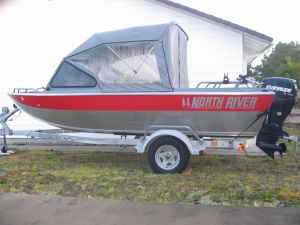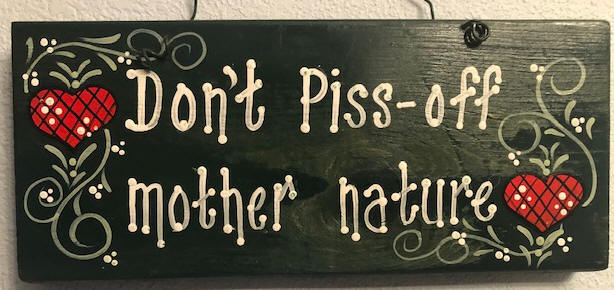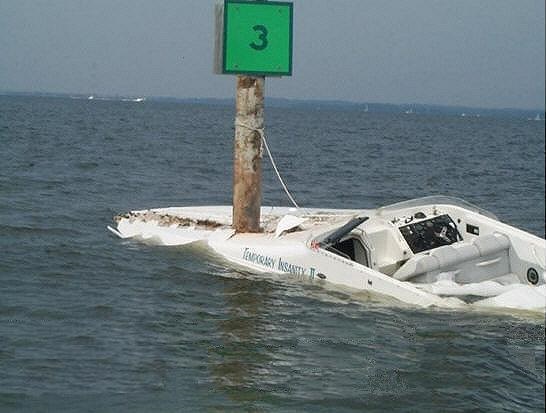
Pre Trip Check List
 |
|
Safety on the
Water ; Safety on the water should be your prime concern on any water
related outing. I
have had a deal with my wife for a good number of years, I can go fishing just
about when I want, IF I BE SURE TO COME HOME. And I really try, because if I don't
make it home, I would probably turn over in my grave if she sold my gear for what some helpful
"friend" offered her. Remember a dead fisherman catches no
fish, wear your PFD.
I make it a point to go over EVERYTHING on, AND in my boat to be sure it is in Tip Top shape before the season starts, then about mid season also. So many things can go wrong, that we may or may not have control over, that there is no sense in tipping the balance away from us. And boats are not like cars driving down a road, where they can pull over to the shoulder of the road if a fan belt breaks.
I have seen so many boater owners who should not even be allowed to own and operate a boat, much less be a passenger on one. I have known a couple of boaters who had no clue as to what they were doing or the consequences involved, and it was never their fault when something of the many things that have went wrong over the years. I am not saying these people are dumb, but very surely that they are NOT boating savvy. They are people I would not recommend to be left alone with a sharp knife or even a pencil sharpener. It also seems that at times the size of the brain decreases with the size/value of the boat. And alcohol is a NO NO on the water even for passengers on my boat. Remember if something bad happens, the skipper is the one who has to answer for it. Take a boating class.
Hell, take 2 boating classes. AND I have even been known to screen/sort/delete my passenger invite list after the first ride.
It does not make a lot of difference if your intended trip is on a small lake or 40 miles out in the open ocean, if something bad is going to happen, life threatening situations can happen on either. Just the odds for it being worse are not on your side out at open sea. If you are heading out to sea, be darned sure you understand what you are getting into and your boat is seaworthy enough to handle it and YOU are enough of a skipper to deal with anything that comes along.
If this is a new adventure for you, bum a ride with someone who has been there more than a few times before, ask many questions and BE VERY observant. Then run with a buddy boat. If you are dumb and happy, you can get into DEEP DO-DO very quickly if you do the wrong things at the wrong time. I am not really afraid of the water, but I do have a hell of a lot of respect for it, AND Mother Nature. Rule number one, DON"T PISS HER OFF.

While you are behind the wheel of a boat, be at least as observant as when you are driving a car. Have eyes on everything around you. NEVER let your attention slip. If you have any passengers onboard, have them be on the lookout for other boats, logs, floating debris, crab pot floats or anything that could create a problem.
Have a briefing with your crew before each departure. They need to know how to start and minimally operate the boat if you happen to have a medical emergency. They need to understand how to navigate back to port, (follow GPS trails if applicable). The also need to know what to do in a MOB (Man Over-Board) situation. Have them practice throwing a life cushion at an object. If nothing else they need to know how to deploy an anchor, or drift socks.
| Quite a proper name "Temporary Insanity II" |
 |
For boating, WIND (at least for a non
sail-boater) is not your friend. Check the marine weather forecast before
you head out, and hourly if there is any indication of a possible change.
You may have to time your time on the water or your departure/return with the weather report
and or the
tide. You may have to cut your trip short, or cancel an outing
depending on the weather, and doing so does not mean that you are a sissy, but
being caucus on the safe side. Just because the boat moored next to you went
out in somewhat bad weather, that does not mean you have to. His boat may
have attributes, or that he has experience beyond yours that enable him to be
able to function in conditions that could be deadly for yours.
Make out a Float Plan and leave it with someone in case you do not show back or call them at the scheduled time. CLICK HERE for a link to a Float Plan.
Check List ; For those of us that do not get the opportunity to fish about year around, because we have other commitments, weather or what ever, before you drag the boat, motor and trailer out especially for the first trip of the year, or any trip later for that matter, it may be a good idea to go thru a check-list. The first trip of the year will be the one that things sneak up on you and things can go wrong, like a seized steering system that you do not find out about until after you launch the boat, then have to paddle to the dock (against the wind).
Listed below is a suggested boating season starting list, which you can add to. After the initial season trip, a mini check-list before every trip might be a good idea.
Boat Trailer:
Check trailer tire air pressure Boat:
Check trailer wheel bearings
& re-grease if needed
Pull wheels to ensure they are not rusted to hub & then check the lug nuts for
rust & re-tighten
Check trailer lights
Check hitch latch
Check winch functioning & gear latched
Check or replace winch cable/strap
Grease tongue jack stand
Boat tie downs
Brakes (if applicable)
Break away brake cable for electric brakes
Safety chains to towing vehicle
Safety chain to boat bow eye
Check, bunks or rollers
Lock the trailer hitch (get in a habit of padlocking it)
PFD (worn inflatable life vests preferred)
Check electrolyte & recharge batteries
Check battery terminals for corrosion, nut tightness
Raise motors & latch them up for towing
Check for frozen
(seized) steering system
Check fuel quantity, oil reservoir & oil ratio if applicable
Check your fuel/water separator
(drain/replace the canister)
Carry a spare fuel-water
separator canister
Bilge Pump operational ?
Fire extinguisher
Lubricate the convertible top snaps if they have been exposed to salt
water
Lubricate the convertible top zippers
Check windshield wiper blades
Check radio antennas
Do a radio transmission check
Check GPS antennas
Is compass in place & correct?
Did you replace the anchor & rope after you tethered the horse?
Convertible top secured if lowered during towing
Check functioning of your downriggers
Check horn (if electric, it may be an indication of a weak battery)
Check or charge batteries
If using anchor buoy, is the slider in good condition?
Mooring lines
Bumpers
First Aid kit?
Wool blankets onboard?
Tool box
Spare parts
Spare prop
Spare prop cotter pins
Prop removal wrench
Check all through
the hull
fittings
Drain plug that fits your freshwater inlet
Are your emergency signaling devices or flares current?
Check the electrical connections for your stern light
Is deck clear of clutter?
If you fish alone, do you have a tether from you to the boat that allows
you to get back in if you fall overboard?
Throw cushion or recovery throw unit with long enough line?
Do you have a plan to recover if in a Man Over Board situation
Motor :
Run motors with muffs the
night before a outing
Spare spark plugs (sealed in a vacuum pack)
Check lower unit oil
Spare ignition key
Spare prop
Remove prop & lube shaft splines
Prop removal tools
Check fuel line pump bulbs
for flexibility
If a 2 cycle, is your oil reservoir tank full?
If 4 stroke, is the crankcase oil full?
Extra oil ?
Trolling motor connector rod
Spare emergency starter rope
Towing Vehicle :
Check air in tires & spare
Check engine oil
Check automatic transmission oil level
Check coolant
Check windshield washer coolant
Fuel tank full?
Trailer light connector wired OK
Spare key hid outside cab
Siphon hose
Miscl :
Check weather report
Tide book
Spare batteries for hand held GPS
Current fishing regulations
Insulated
bait box
Tackle box
Rods
Landing net
Ice box
Ice
Rain gear
Polaroid Sunglasses
Fishing hat
Drinking water
Lunch box
Fishing license
for everyone on board
Boat launch permit hang tag
Medication
Seasick pills
Navigation
charts
Pliers/hook-out
Heavy duty plier/side cutters (to cut of imbedded hooks)
Tool box
(with tools)
Life jackets
Throwable cushion
Paddle
Fish bonker
Camera
Boat hook
Fish box
Spare drain plug
Downrigger tool box
Wash towel
Other Things to Consider ;
Before you drive off, check to see if you remembered to latch the trailer coupler latch. Get in the habit of padlocking it, this is a reminder to actually lock it down. This accomplishes two things, (1) it reminds you to latch it and (2) may keep someone from borrowing the trailer while you are out fishing.
| Padlocking the latch |
|
|
When towing your boat, stop occasionally and put your hand on the wheel hubs, they very likely will be slightly warm, but if one is warmer than the others, there could be a problem. Either the bearings are bad, need grease, or the brake shoes are dragging the drum if it has brakes. Do the same with tires, if they are getting hot, you may not have enough air in them.
Kick the trailer frame in different locations. This may sound dumb, but if something may be loose but being partly held in place by the weight of the boat, you may just stumble onto a problem before the trailer falls apart on the road.
Also after you pull the boat out of the water and head home, drive a few miles, stop and pump saltwater resistant grease into the hubs if they are the grease lubricated type. This time interval will allow the hub to warm up, then accept grease better, allowing any accumulated water to be pushed out more readily.
Consider carrying a spare trailer hub with bearings and a seal. When doing wheel bearing maintenance, do not replace the double lip seal marine seal with a single lip one that the automotive people have. They may not have any cross-reference to the marine double lip type. Go to a boat shop and the price of $3.50 each is cheap compared to the price of replacing a complete hub, brakes, and possibly a spindle or whole new axle if you donít catch the bad bearing in time.
The last item listed above pertaining to your small boat stern light (all around night or mooring light) is something that this light is usually mounted on top of a removable pole. It usually plugs into a receptacle on or near the stern. This pole when not in use us usually snapped into clamps under the side of the gunwale. The receptacle on the deck SHOULD have a cover to protect the wire terminals. If you happen to frequent saltwater, these terminals WILL get corroded. This pertains to BOTH the pole terminals and the receptacle terminals And it is way better to clean them before you really need them. I have found that the best method of removing this green salt type corrosion is to use Que Tips soaked in Zylene. Once the terminals are clean then coat them lightly with Vaseline.
TIRES -- Tires are what transport your boat to where you are going. Do not overlook them, or their means of being attached to your trailer. How many times have you seen an unfortunate boater setting along the road with tire/wheel problems? And usually it is not going to be a happy outcome.
If you happen to pick up a nail or something in the tire and get a flat, do you have wooden blocks and a jack (that fits under your now lower axle)? Do you have the proper sized lug nut wrench? Even if you do on the above items, are the lug nuts/bolts free of rust enough that you can even remove them? Even are your spare tire carrier nuts removable and not rusted in place? I have seen these nuts rusted so bad that the retainer bolt had to be twisted in two (requiring a lot of effort) to allow the spare to be removed.
If you even infrequently launch in salt water you may consider for your yearly spring check list to remove the wheels, clean the threads coat them with anti-seize, or at least spray the threads with WD-40. I even paint the wheels each spring with a light coat of 90W gearcase oil even though the wheels are galvanized, just to help prevent salt corrosion, as most of us back the trailer in to where the tires/wheels are in the water.
While you are at it, also consider rotating the tires. You do this on your vehicle, why not the boat trailer as well? In the photo below, the inside corner is worn down on this tire, maybe it's time to rotate it.
While the tire is off, maybe it is also a good time to manually rotate the hub, feeling for rough/bad bearings at the same time.
| Worn edge |
 |
On the photo above, this tire was used on the newer torsion axle instead of the older spring mounted type. It is my opinion, that on these rubber mounted torsion systems that IF the rubber gets slightly worn OR the axle arm is no exactly true, that any amount of mismatch may result in this type of wear. And there is not much that can be done about it by the boater. And the trailer manufacturers say they can not remount new rubber bushings, but you need a new axle. ??? But a good vehicle alignment shop can adjust (bend) the axle to proper alignment.
Copyright © 2002 - 2023 LeeRoy Wisner All Rights Reserved
Back to the Main Ramblings
Page
Originated 05-03-2002 Last updated
04-04-2023
***
Contact the author